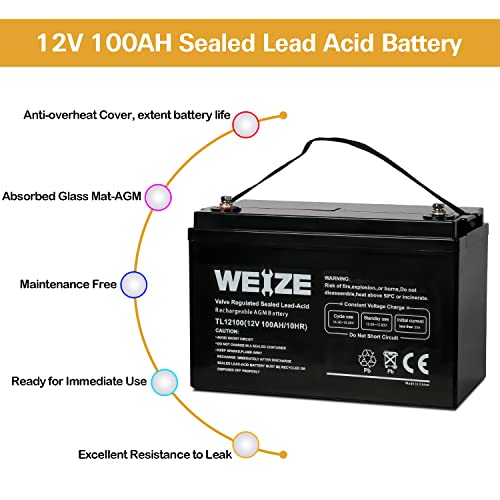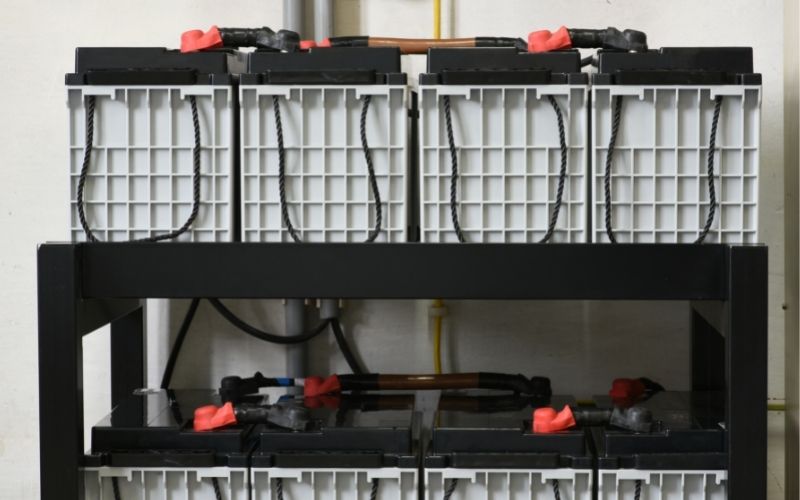So, you need to invest in a new marine deep cycle battery for your boat. Maybe your old trolling motor battery finally bit the dust, or you’re installing an inverter on your boat and you need to add a battery to power it.
Whatever your reason for needing a new battery, you probably have the same question: How long does a marine deep cycle battery last?
How many hours can you expect to get from your battery before having to recharge it?
How many years can you expect it to last overall?
Keep reading!
In this article, we’ll answer all of these questions and more!
Table of Contents
How Many Hours Does a Marine Deep Cycle Battery Last?
It’s impossible to say exactly how long your battery will last between charges. The hours you will get from a single charge depends on many factors, including:
- Amp hour rating: The amp hour rating tells you the battery’s maximum amp output in an hour. So a 100-Ah battery would have a max amp output of 100 in an hour, 50 in 2 hours, 25 in four hours, etc. A 50-Ah battery would put out 25 amps in two hours.
- Load: If you are drawing 100 amps from a 100-Ah battery, the battery will last you about an hour. If you’re drawing 50 amps, it will last about two hours, and so on. To get more hours out of your battery, decrease the amount of power you draw from that battery.
- Type and quality of battery: Lithium batteries are generally expected to last longer than other batteries because they can be more deeply discharged–up to 95 percent. That said, a low-quality lithium battery may die sooner than a high-quality lead-acid battery.
- Age and condition of battery: Batteries tend to discharge more quickly as they age because their ability to hold a charge goes down. Even if your battery is fairly new, it may discharge more quickly if it is in poor condition.
- Weather and water conditions: If you are out in high winds and choppy waters, these environmental conditions will put more of a strain on your battery, causing it to discharge more quickly. Extreme temperature exposure will have a similar effect.
What is the Lifespan of a Marine Deep Cycle Battery?

So, how many years can you expect to get out of your marine deep cycle battery? A battery’s total lifespan also depends on several factors, including:
- Type and quality of battery: Lithium batteries are expected to last longer than lead-acid batteries–sometimes 10 years or more. But again, quality sometimes trumps battery type. A good-quality lead-acid battery may last longer than a poor-quality lithium one.
- Use: If you are out on the water every weekend, you will probably need a new battery sooner than if you only went out once a month. Also, if you consistently overload your battery and draw the max number of amps, it will wear out sooner.
- Exposure: Consistent exposure to rain, sea spray, direct sunlight, and temperature extremes will take a toll on your battery over time. If your battery is protected from these types of exposure, it will last longer.
- Care and maintenance: Performing the proper maintenance for your battery type will help it last longer. Regular inspections, keeping the battery clean, and drying it off when it gets wet will also help to extend its lifespan.
How Long Does a Marine Deep Cycle Battery Stay Charged Without Use?

As you can probably tell by now, every battery is different, and multiple factors affect its life. The same is true when it comes to your battery’s ability to hold a charge during periods of inactivity.
Your battery will slowly lose its charge over time unless you have it hooked up to a maintainer, which will keep a low level of charge going into the battery for long periods when you aren’t using it.
In general, if your battery is sitting in storage without a maintainer and regular recharging, it should stay good for about three months. Though, as you might expect, there are a few factors that may affect this, including:
- Age of battery: As noted above, older batteries tend to lose their ability to hold a charge over time. Old batteries sitting in storage will almost certainly lose their charge more quickly than newer batteries will.
- Type and quality of battery: Once again, the type and quality of the battery will also play a role. High-quality batteries will hold their charge better than low-quality batteries, and high-quality lithium batteries tend to hold a charge the longest.
How Long Will a Marine Deep Cycle Battery Last With an Inverter?
If you are using a marine deep cycle battery to power your inverter, then it will depend on how much power the inverter is drawing weighed against the battery’s capacity, age, type, and quality.
If you have a 1000 watt inverter, it will likely be drawing about 92 amps from your battery. In this case, a 100-Ah battery should, in theory, power the inverter for about an hour.
Again, though, there are other factors that influence how long your battery will last, and it’s important to take all of these factors into account when figuring out how much time you can expect to get from your battery.
Check out this helpful article for calculating how long the battery may last and what size battery you’ll need to power an inverter.
Conclusion
Marine deep cycle batteries may last anywhere from an hour up to several hours depending on the type and size of the battery, what it’s powering, the condition of the battery, and various environmental factors. It’s impossible to say exactly how long the battery will last.
The same is true of a battery’s overall lifespan. Generally, marine deep cycle batteries are expected to last between 2 and 10 years, but they may last much longer or shorter than that depending on how they’re used and how they’re taken care of.

Sarah Hood has been writing for Anchor Travel since 2021. When she’s not writing, she enjoys cooking, singing, and spending time in the great outdoors.

